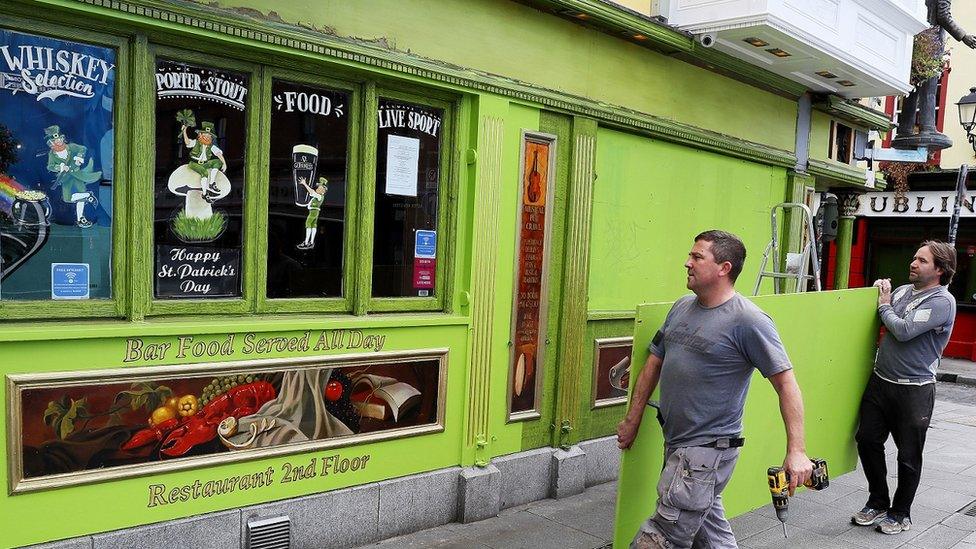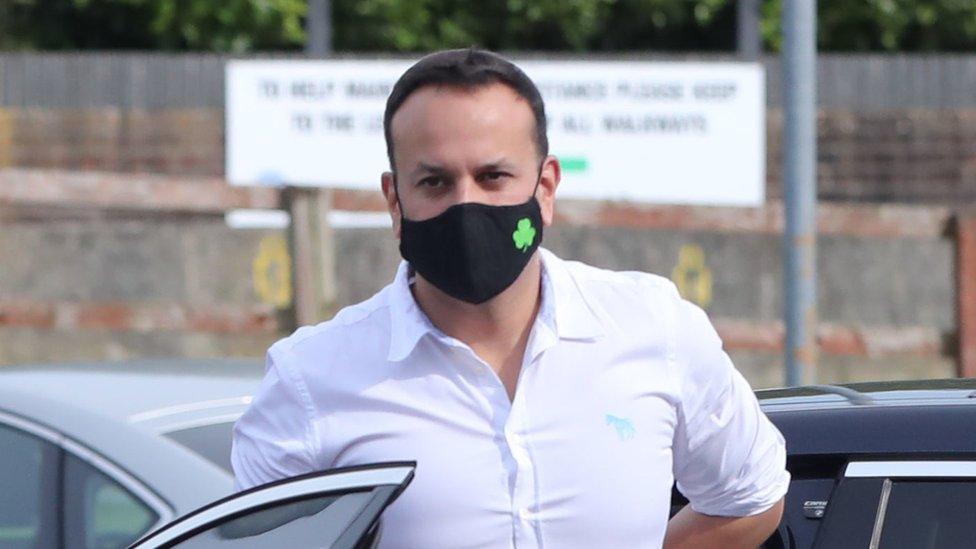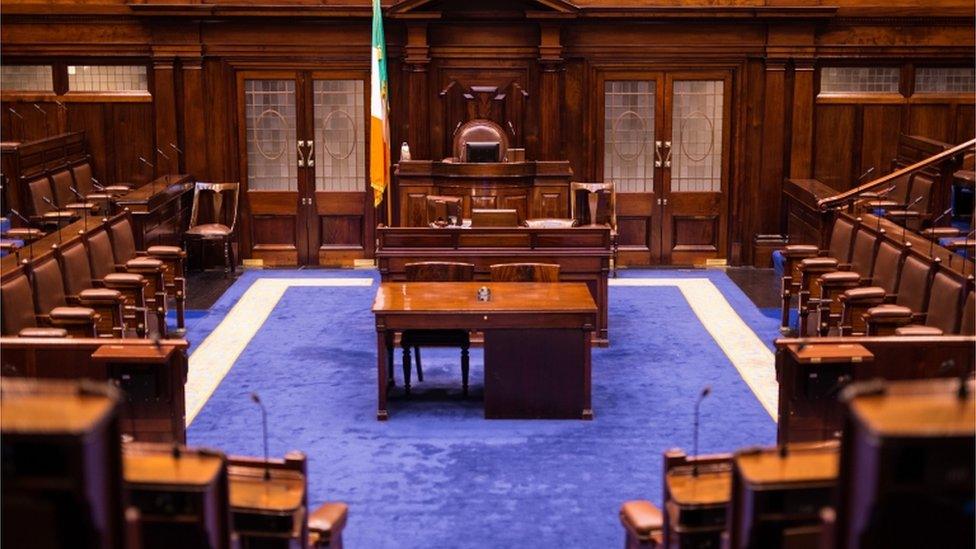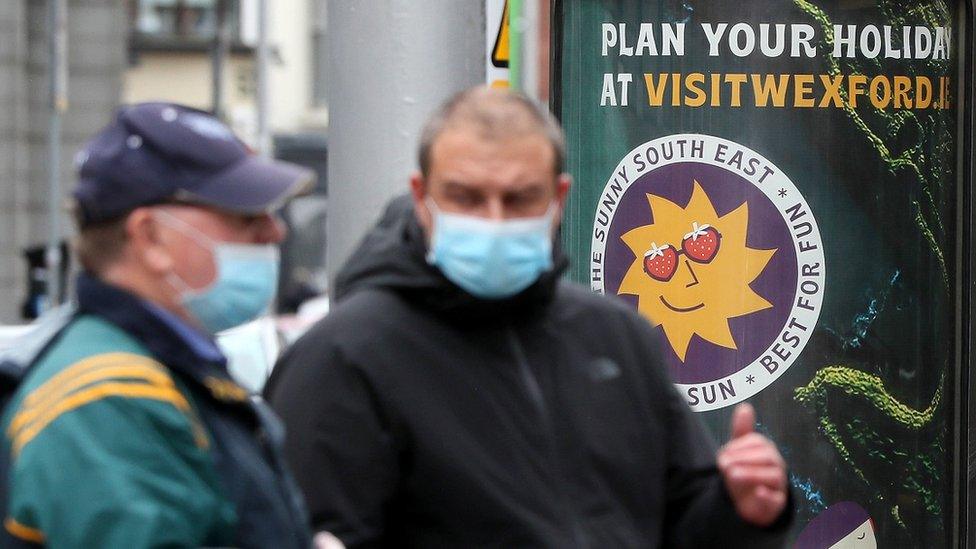Coronavirus: Irish government to tighten restrictions in Dublin
- Published

Workers board up a pub in Dublin city centre ahead of the confirmation that the city would face tighter Covid-19 restrictions
The Irish government has agreed to tighten restrictions in Dublin because of the rising levels of Covid-19.
It is based on recommendations from public health officials at the National Public Health Emergency Team (NPHET).
From midnight on Friday, for the next three weeks, people will be discouraged from leaving the city and county unless for essential reasons.
They are again being asked to work from home where possible and only to make essential journeys on public transport.
In Dublin city visitors to private homes and gardens should be limited to a maximum number of six from one other household.
There are to be no organised indoor gatherings and outdoor gatherings are to be up to a maximum of 15.
Restaurants and pubs that had been serving food will only be allowed to cater outdoors or provide a take-away service.
Outdoor dining is limited to a maximum of 14 customers.
Pubs in the rest of the Republic, regardless of whether they serve food, will be allowed to open on Monday.
Pattern of cases in Dublin 'different'
In Dublin, the numbers allowed to attend weddings from Monday will fall from 50 to 25 for the next three weeks and only elite sport will be allowed to continue.
From midnight, the numbers allowed to go to funeral services will also fall from 50 to 25.
Sports training can continue but only outdoors and in pods of up to 15 and no gym classes can proceed.
The city and county is being moved from level two to level three with some additional measures because of the levels of the virus in the city and county.
The country is working on a five-level alert system and the government decides when to move between levels based on advice from the NPHET.
The leaders of the three coalition parties in the government held a news conference confirming the measures on Friday.
'Dangerous place'
Taoiseach (Irish prime minister) Micheál Martin said the threat of Covid-19 is growing ''on our island''.
He said the capital was "a very dangerous place" and that without action there was a real threat that Dublin could return to the worst days of the crisis.
"I know the restrictions will make many people angry but we have very clear advice that they will save lives," said Mr Martin.
He that aside from being taoiseach he was "a father, husband, brother, sports fan and someone who likes a pint with my friends''.
He added that he knows how "exhausting and infuriating" it is for the public as attempts are made to manage the virus.

Leo Varadkar said the virus had been growing at a considerable rate in recent days
It is understood NPHET has told the government that the level and pattern of cases in Dublin is very different than anywhere else in the country.
Fears were expressed that if the current pattern of hospital admissions continued, this would impact on healthcare delivery more broadly.
NPHET also flagged concerns about the rest of the country, but said that further measures above level two are not required at the moment.
The acting chief medical officer said Dublin was at an extremely critical juncture and the window of opportunity to bring Covid-19 under control without significant additional measures is no longer available.
Dr Ronan Glynn said moving Dublin to level three was a "proactive and proportionate response".
On Thursday, Tánaiste (Irish deputy prime minister) Leo Varadkar told the Dáil he expects local county lockdowns to be imposed "in the coming months".
Mr Varadkar said the virus had been growing at a considerable rate in recent days.
Three further deaths and 253 new Covid-19 cases were confirmed on Friday.
It brings the total number of coronavirus deaths to 1,792 in the country.
There were 116 cases in Dublin, 22 in Kildare, 14 in Cork, 14 in Galway, 13 in Donegal, 10 in Limerick, 10 in Louth, 9 in Mayo, 8 in Waterford and 7 in Wicklow.
The remaining 30 cases are located in Carlow, Cavan, Clare, Kilkenny, Laois, Longford, Meath, Monaghan, Offaly, Tipperary, Westmeath.

Placing Dublin at level three has the following implications for those living or working in Dublin:
Visitors to private homes and gardens should be limited to a maximum number of six from one other household.
No social/family gatherings should take place, with exemptions to this for weddings and funerals (see below).
No organised indoor gatherings should take place. Organised outdoor gatherings are permitted, up to a maximum of 15 people.
People living in Dublin should remain in the county (i.e. they must not leave Dublin to travel either domestically or internationally), with the exception of those who must travel for work, education and other essential purposes.
People living outside of Dublin should not travel to Dublin, with the exception of those who must travel for work, education and other essential purposes.
People working in Dublin are asked to work from home unless absolutely necessary.
Schools, Early Learning and Childcare services should remain open. Adult and Higher Education Institutions should remain open, but are asked to review protective measures and take steps to limit congregation as much as possible.
You are asked to walk or cycle where possible so that public transport is available for use by essential workers and for essential work only.
- Published16 September 2020

- Published18 August 2020
